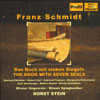Schmidt (Das) Buch mit sieben Siegeln
Apocalyptic – but without the hellfire: this Schmidt is a choral landmark
View record and artist detailsRecord and Artist Details
Composer or Director: Franz Schmidt
Genre:
Vocal
Label: Edition Günther Hänssler
Magazine Review Date: 13/2007
Media Format: CD or Download
Media Runtime: 113
Mastering:
Stereo
DDD
Catalogue Number: PH05029

Tracks:
| Composition | Artist Credit |
|---|---|
| (Das) Buch mit sieben Siegeln |
Franz Schmidt, Composer
Eberhard Büchner, Tenor Franz Schmidt, Composer Gabriele Fontana, Soprano Horst Stein, Conductor Kurt Azesberger, Tenor Margareta Hintermeier, Contralto (Female alto) Martin Haselböck, Organ Robert Holl, Bass Robert Holzer, Bass Vienna Symphony Orchestra |
Author: kYlzrO1BaC7A
Premiered in 1937, Franz Schmidt’s late masterpiece occupies a position between Passion and oratorio, the sacred and the secular. Most of all, it presents the revelation of the Apocalypse in terms far removed from the sensationalist: an event that will take place if only because civilisation must, at some point, come to a close. Not a work to have “travelled” in terms of performance, several recordings have appeared on CD, and this release enters a competitive field.
Among those accounts, that by Franz Welser-Möst has greater dramatic momentum while Nikolaus Harnoncourt’s conjures up a true metaphysical epic. Horst Stein risks seeming underwhelming by comparison, yet his reading captures the work’s inner repose more completely than either. In this respect, it most resembles the recording by Alois Hochstrasser, though the standard of performance is appreciably higher. Above all, it has a wholly convincing Johannes in Eberhard Büchner – his lyric tenor not lacking dramatic projection at climactic moments and carrying the narration with clarity and vigour. As the Voice of the Lord, Robert Holl is not overbearing in his rhetoric, while the vocal quartet (used sparingly) blends admirably in ensemble. Martin Haselböck is fully attuned to the densely textured organ part, and Stein draws wholehearted but disciplined contributions from his chorus and orchestra – aided by the close but well balanced sound.
Das Buch mit sieben Siegeln is likely thought an acquired taste, but such passages as the slaying of the infants (disc 1, tr 7), opening of the seventh seal (disc 2, tr 1) and the culminating “Hallelujah chorus” (tr 5) evince an intensity and majesty comparable to any choral work from the last century. The absence of an English translation and the convoluted booklet-note are drawbacks but Stein’s authority and dramatic acuity convey the music’s essence in gratifying measure.
Among those accounts, that by Franz Welser-Möst has greater dramatic momentum while Nikolaus Harnoncourt’s conjures up a true metaphysical epic. Horst Stein risks seeming underwhelming by comparison, yet his reading captures the work’s inner repose more completely than either. In this respect, it most resembles the recording by Alois Hochstrasser, though the standard of performance is appreciably higher. Above all, it has a wholly convincing Johannes in Eberhard Büchner – his lyric tenor not lacking dramatic projection at climactic moments and carrying the narration with clarity and vigour. As the Voice of the Lord, Robert Holl is not overbearing in his rhetoric, while the vocal quartet (used sparingly) blends admirably in ensemble. Martin Haselböck is fully attuned to the densely textured organ part, and Stein draws wholehearted but disciplined contributions from his chorus and orchestra – aided by the close but well balanced sound.
Das Buch mit sieben Siegeln is likely thought an acquired taste, but such passages as the slaying of the infants (disc 1, tr 7), opening of the seventh seal (disc 2, tr 1) and the culminating “Hallelujah chorus” (tr 5) evince an intensity and majesty comparable to any choral work from the last century. The absence of an English translation and the convoluted booklet-note are drawbacks but Stein’s authority and dramatic acuity convey the music’s essence in gratifying measure.
Discover the world's largest classical music catalogue with Presto Music.

Gramophone Digital Club
- Digital Edition
- Digital Archive
- Reviews Database
- Full website access
From £8.75 / month
Subscribe
Gramophone Full Club
- Print Edition
- Digital Edition
- Digital Archive
- Reviews Database
- Full website access
From £11.00 / month
Subscribe
If you are a library, university or other organisation that would be interested in an institutional subscription to Gramophone please click here for further information.




